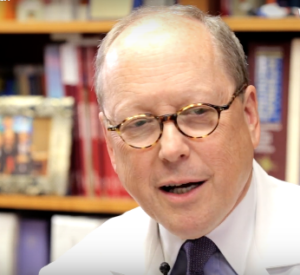 Editor’s note: Rheumatologists who are outstanding researchers, educators and/or clinicians, who provide consistently exceptional care to patients, have achieved a level of distinction in the field and serve as role models for colleagues and trainees are highlighted in this recurring series.
Editor’s note: Rheumatologists who are outstanding researchers, educators and/or clinicians, who provide consistently exceptional care to patients, have achieved a level of distinction in the field and serve as role models for colleagues and trainees are highlighted in this recurring series.
Be curious. Listen to your patients. Demonstrate empathy. These traits, according to Herbert S.B. Baraf, MD, FACP, MACR, are just some of the characteristics demonstrated by expert clinicians. And he should know.
Dr. Baraf is a founding member and former managing partner of Arthritis and Rheumatism Associates (ARA), the country’s largest private practice rheumatology group. He is a clinical professor of medicine at The George Washington University School of Medicine, Washington, D.C., and a clinical associate professor of medicine at the University of Maryland School of Medicine, Baltimore. Dr. Baraf founded the Center for Rheumatology and Bone Research, ARA’s research division, and has served as a principal investigator on more than 350 clinical trials studying new treatments for more than a dozen rheumatic disorders including gout, rheumatoid arthritis, systemic lupus, Sjögren’s disease, osteoporosis, psoriatic arthritis and osteoarthritis.
A nationally recognized authority on issues of rheumatology practice management, Dr. Baraf has lectured throughout the U.S. on topics of practical importance to practicing rheumatologists. In 2014 he was honored by the ACR with the Paulding Phelps Award for his contributions to patient care, rheumatology and the practice of medicine.
The Rheumatologist (TR): In your opinion, what makes for an expert clinician?
Dr. Baraf: An expert clinician is a physician who has a depth of experience, is extremely intellectually curious, is adept at truly listening to patients, demonstrates empathy, understands the science underpinning key concepts in medicine, is up to date on current therapeutics and research, and is honest about what he or she does and does not know.
Building knowledge through experience, in my view, is one of the most important habits. When I was a 28-year-old, first-year rheumatology fellow on rounds with my attending, I started to discuss my views on a patient’s diagnosis and management by using the phrase, ‘In my experience …’ My attending stopped me right there.

Dr. Baraf
‘In your experience?’ he asked. He noted that I had not yet had the opportunity to develop such experience and that it would take time to benefit from years of working with and treating patients.
Now, much deeper into my medical career, I understand that observing the natural history of disease, reflecting on successes and failures in medical management, and following patients over time allow a clinician to have a broad-based perspective and better see the entire picture.

